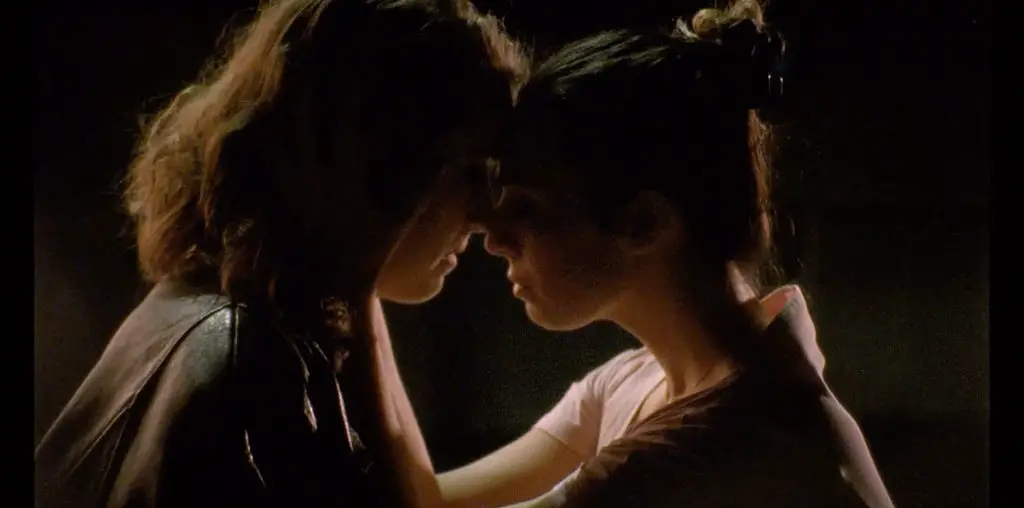
It appears the only thing Jason Honeycutt did not do during the production of the Hawaiian set film Leland is act in it. He directed, wrote, produced, edited, and was the director of photography on the short movie. Though there are two actors, each with minor roles, with the same last name, so it was a family affair. Which is too bad, as getting a fresh pair of eyes and some much needed critical distance would have improved this sweet-natured yet hamfisted production immensely.
Lindsay (Taiana Tully) is fiddling around with a solar-powered gizmo that is perfect for the humid climate of Hawaii while talking to her best friend Jordan (Charles Revard). He is prepping to leave whichever island they are on to move to California for work as a game designer (possibly to go to school for such, as with a lot on in the movie, it is not clear). She laments that she also can’t leave, as her family needs her income to stay afloat.
While her mom Janelle (Angelica Quinn) works, she does not make enough in her office job to cover all the bills. So Lindsay works at a convenience store to help out. Leland (Garret Sato), her dad, is an alcoholic with no ambitions who sunk Lindsay’s college fund into a pyramid scheme involving lightbulbs. Her mom is at her wit’s end, and Jordan is, rightfully so, trying to convince Lindsay that she owes her dad nothing whatsoever. When one of Leland’s money schemes involving Obachan (Laura Lee) comes to light, it is the final straw. Can Lindsay find a way out from under the burdensome family obligations she feels? Does Leland ever sober up?
“…Jordan is, rightfully so, trying to convince Lindsay that she owes her dad nothing…”
Leland is a pretty big mess from start to finish but let’s start with the good aspects first Taiana Tully is quite good as the conflicted and trapped Lindsay. Tully’s chemistry with her onscreen parents is good, and she sells the unspoken attraction between her and Jordan well. For his part, as the best friend, Revard is charming and sweet and only wants what is best for Lindsay. Quinn as the put upon mom is also decent, able to sell her frustration and wit’s end believably, despite being saddled with exposition-heavy dialogue.
Sadly, on the acting front, the titular character is not well acted. Sato bumbles about in an over-the-top fashion as the drunkard, and it is so too goofy to believe. If this were a W.C. Fields film, he’d fit right at home, but this is not even emulating the style of the beloved comic. Leland strives to be a dramatic family portrait, yet falls apart because everything Sato does is so ludicrous it does not mesh with the tone or attitude of the movie.
Even worse is the editing. The opening sees Jordan and Lindsay messing with those gadgets- which for one do nothing in that scene and secondly, never come back into play in any way whatsoever- then there’s a brief establishing shot of a bar. Cut to the inside of the bar where some people are drinking, one man, in particular, is heavily indulging. Cut back to outside where Lindsay strolls up the street, which is presumably close to the bar but is never established as such.
There is nothing about the way the first scene ends to suggest she is leaving and there is nothing about the establishing bar shot to imply Lindsay is close. As such, it appears Lindsay teleports onto the scene and is awkward. But, the worst editing comes shortly after it is revealed that Leland’s been stealing from Obachan.
As a drunk Leland passes out on the couch, an elderly Obachan demands to get ice cream; a weekly tradition of hers and Leland’s. Lindsay offers to take her instead. After getting to town, Lindsay calls her mom to let her know that Lindsay will be unable to cook dinner tonight as she went to town with Obachan and Leland is drunk. One must presume that the trek to town is time-consuming, otherwise, why can’t Lindsay simply start dinner a little bit later than usual?
“…Honeycutt is as good at establishing time jumps as he is locations, which is to say not at all…”
That phone call ends, and we cut back to the family’s house. Janelle enters cautiously, unsure of who’s home or if Leland is still out cold from drinking too much. While the deadbeat is up, Lindsay is home as well, just playing (or texting) on her phone. What? Huh? If Lindsay is already back and literally not doing anything else, why didn’t she start dinner? The way one scene flows to the next is unbearably awkward and clumsy.
This also points to the terrible story structure. Lindsay explicitly states she will not be home in time to start dinner yet she is home before the person who will begin cooking dinner, so that is a baldfaced lie. However, Janelle does not view it as such, and Lindsay offers to help out once her mom gets home anyway. Therefore that conversation from earlier only serves to make Lindsay appear lazy and wastes the audience’s time. At just 23 minutes, Leland has scant screentime to waste.
Jason Honeycutt should have hired someone to edit his short movie if just to get a fresh set of eyes onto the project to explain where things don’t fit. The characters are not likable or interesting, and randomly making them half-Japanese (Obachan means aunt) means nothing and is just another inexplicable thing to happen in Leland. The editing is awkward, making it continuously appear that the characters can teleport between places. The dialogue makes liars out of people, however unintentional, and feels like it is all exposition. The idea of being obligated to one’s family because their family is crap, and there needs to be an anchor there to explain why Lindsay feels this way. There isn’t one, which makes the whole premise impossible to get behind. Aside from some of the actors giving decent performances, Leland fails, hard, on all fronts.

Leland (2019) Directed by Jason Honeycutt. Written by Jason Honeycutt. Starring Taiana Tully, Garret Sato, Angelica Quinn, Charles Revard, Laura Lee.
2 out of 10 Gummi Bears

